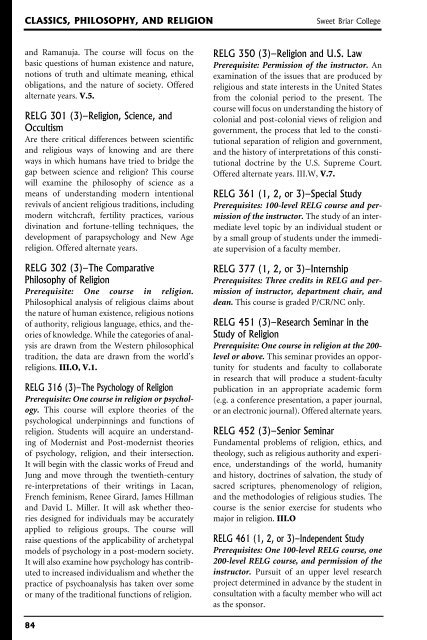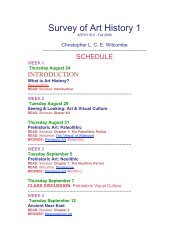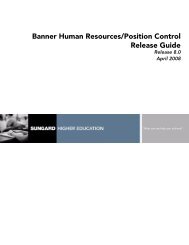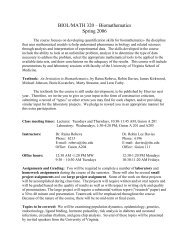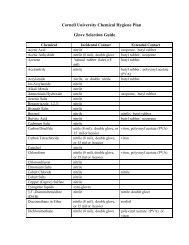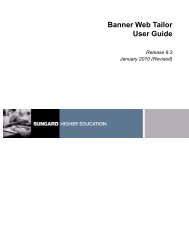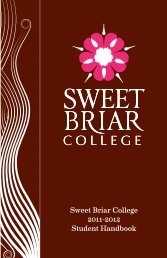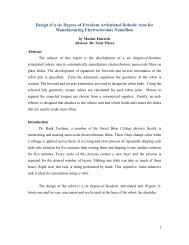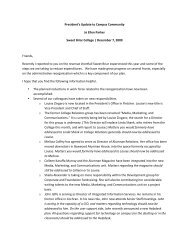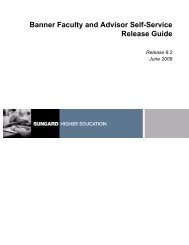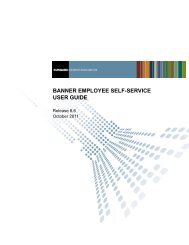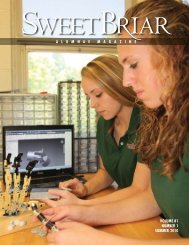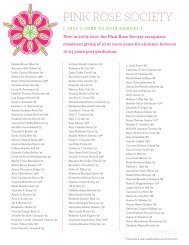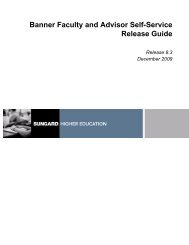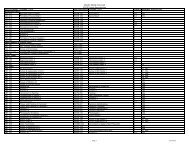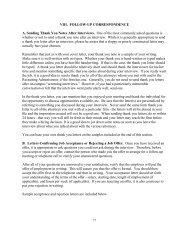2010-2011 - Sweet Briar College
2010-2011 - Sweet Briar College
2010-2011 - Sweet Briar College
- No tags were found...
Create successful ePaper yourself
Turn your PDF publications into a flip-book with our unique Google optimized e-Paper software.
classics, philosophy, and religion<strong>Sweet</strong> <strong>Briar</strong> <strong>College</strong>and Ramanuja. The course will focus on thebasic questions of human existence and nature,notions of truth and ultimate meaning, ethicalobligations, and the nature of society. Offeredalternate years. V.5.RELG 301 (3)–Religion, Science, andOccultismAre there critical differences between scientificand religious ways of knowing and are thereways in which humans have tried to bridge thegap between science and religion? This coursewill examine the philosophy of science as ameans of understanding modern intentionalrevivals of ancient religious traditions, includingmodern witchcraft, fertility practices, variousdivination and fortune-telling techniques, thedevelopment of parapsychology and New Agereligion. Offered alternate years.RELG 302 (3)–The ComparativePhilosophy of ReligionPrerequisite: One course in religion.Philosophical analysis of religious claims aboutthe nature of human existence, religious notionsof authority, religious language, ethics, and theoriesof knowledge. While the categories of analysisare drawn from the Western philosophicaltradition, the data are drawn from the world’sreligions. III.O, V.1.RELG 316 (3)–The Psychology of ReligionPrerequisite: One course in religion or psychology.This course will explore theories of thepsychological underpinnings and functions ofreligion. Students will acquire an understandingof Modernist and Post-modernist theoriesof psychology, religion, and their intersection.It will begin with the classic works of Freud andJung and move through the twentieth-centuryre-interpretations of their writings in Lacan,French feminism, Renee Girard, James Hillmanand David L. Miller. It will ask whether theoriesdesigned for individuals may be accuratelyapplied to religious groups. The course willraise questions of the applicability of archetypalmodels of psychology in a post-modern society.It will also examine how psychology has contributedto increased individualism and whether thepractice of psychoanalysis has taken over someor many of the traditional functions of religion.RELG 350 (3)–Religion and U.S. LawPrerequisite: Permission of the instructor. Anexamination of the issues that are produced byreligious and state interests in the United Statesfrom the colonial period to the present. Thecourse will focus on understanding the history ofcolonial and post-colonial views of religion andgovernment, the process that led to the constitutionalseparation of religion and government,and the history of interpretations of this constitutionaldoctrine by the U.S. Supreme Court.Offered alternate years. III.W, V.7.RELG 361 (1, 2, or 3)–Special StudyPrerequisites: 100-level RELG course and permissionof the instructor. The study of an intermediatelevel topic by an individual student orby a small group of students under the immediatesupervision of a faculty member.RELG 377 (1, 2, or 3)–InternshipPrerequisites: Three credits in RELG and permissionof instructor, department chair, anddean. This course is graded P/CR/NC only.RELG 451 (3)–Research Seminar in theStudy of ReligionPrerequisite: One course in religion at the 200-level or above. This seminar provides an opportunityfor students and faculty to collaboratein research that will produce a student-facultypublication in an appropriate academic form(e.g. a conference presentation, a paper journal,or an electronic journal). Offered alternate years.RELG 452 (3)–Senior SeminarFundamental problems of religion, ethics, andtheology, such as religious authority and experience,understandings of the world, humanityand history, doctrines of salvation, the study ofsacred scriptures, phenomenology of religion,and the methodologies of religious studies. Thecourse is the senior exercise for students whomajor in religion. III.ORELG 461 (1, 2, or 3)–Independent StudyPrerequisites: One 100-level RELG course, one200-level RELG course, and permission of theinstructor. Pursuit of an upper level researchproject determined in advance by the student inconsultation with a faculty member who will actas the sponsor.84


